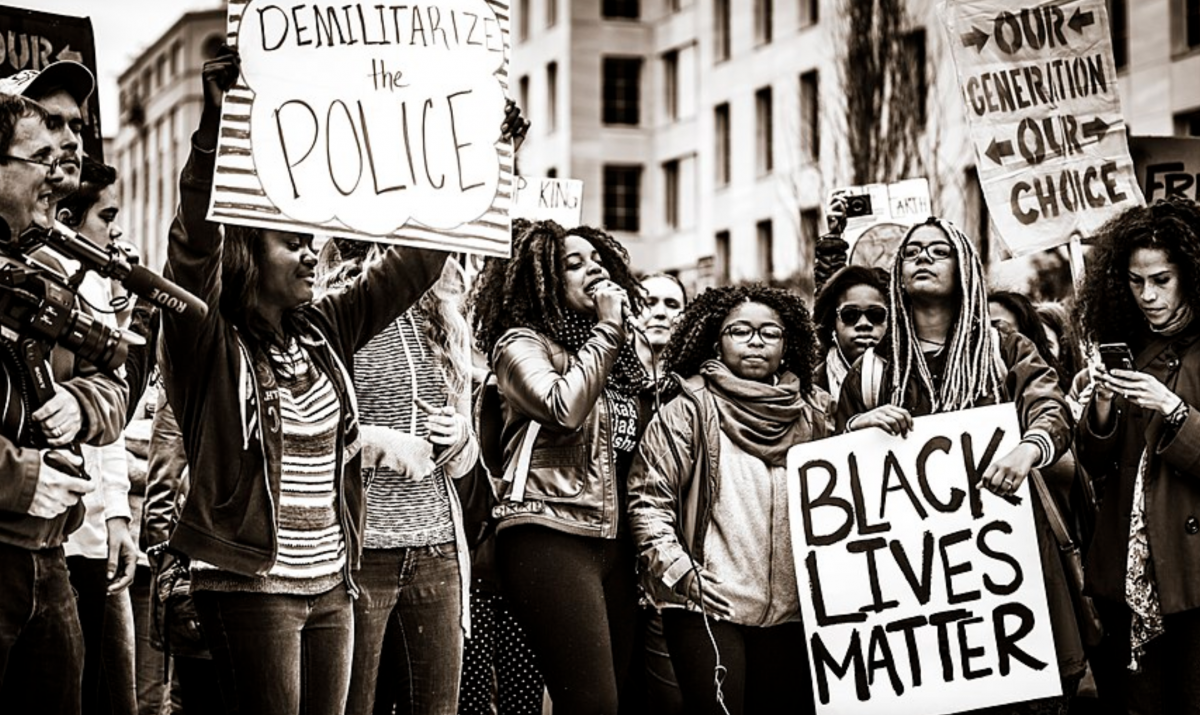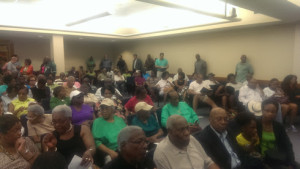Ella’s Song
Refrain: We who believe in freedom cannot rest We who believe in freedom cannot rest until it comesVerses: Until the killing of Black men, Black mothers’ sons is as important as the killing of White men, White mothers’ sons. And that which touches me most is that I had a chance to work with people. Passing on to others that which was passed on to me. To me young people come first, they have the courage where we fail. And if I can shed some light as they carry us through the gale. The older I get the better I know that the secret of my going on is when the reins are in the hand of the young who dare to run against the storm. Not needing to clutch for power, not needing the light just to shine on me, I need to be just one in the number as we stand against tyranny. Struggling myself don’t mean a whole lot I come to realize That teaching others to stand up and fight is the only way my struggle survive. I’m a woman who speaks in a voice and I must be heard At time I can be quite difficult, I’ll bow to no man’s word.Composed by Bernice Johnson Reagon, copyright: Songtalk Publishing Co.
———————————————–
The day after the verdict came out, I had to do SOMETHING!
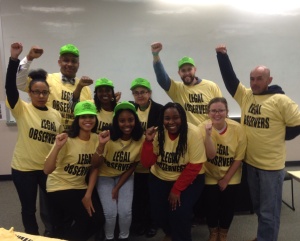 The first thing I did was weep and the second thing I did was get busy. That afternoon, I attended legal observer training hosted by the National Conference of Black Lawyers and the National Lawyers Guild and then went with other legal observers to Underground Atlanta to the protest being held by It’s Bigger Than You. Two things stuck with me from that emotion-filled day; one from the protest rally and the other from the training. As I watched the protestors, I saw the commitment, the consciousness and the courage of young people. I saw the wisdom of the elders whose faces seemed to say “I been here before” and whose marching cadence echoed the Negro spiritual, “I Ain’t No Ways Tired”. I saw a meeting of like minds across race, gender and age. I saw what we will need — ALL of US– if we plan to make this country change. At the legal observer training we were told to be alert for provocateurs who come out, not to support, but to sabotage. As I have watched video clips over the last few days, I have seen police and others engage in actions that have been quickly attributed to the protestors in an effort to undermine and malign the freedom fighters’ cause and justify arrests and acts of brutality. I was reminded of COINTELPRO (an acronym for COunter INTELligence PROgram) that the FBI created to infiltrate, discredit and disrupt the work of activists during the civil rights movements. It is wise for us to remember that we cannot believe everything the media tells us. Just look at all the misinformation that has been shared about Michael Brown!! People must learn to think for themselves and the first step in doing that is to become educated about what is going on. You cannot do that by just listening to the pundits and the talking heads.
The first thing I did was weep and the second thing I did was get busy. That afternoon, I attended legal observer training hosted by the National Conference of Black Lawyers and the National Lawyers Guild and then went with other legal observers to Underground Atlanta to the protest being held by It’s Bigger Than You. Two things stuck with me from that emotion-filled day; one from the protest rally and the other from the training. As I watched the protestors, I saw the commitment, the consciousness and the courage of young people. I saw the wisdom of the elders whose faces seemed to say “I been here before” and whose marching cadence echoed the Negro spiritual, “I Ain’t No Ways Tired”. I saw a meeting of like minds across race, gender and age. I saw what we will need — ALL of US– if we plan to make this country change. At the legal observer training we were told to be alert for provocateurs who come out, not to support, but to sabotage. As I have watched video clips over the last few days, I have seen police and others engage in actions that have been quickly attributed to the protestors in an effort to undermine and malign the freedom fighters’ cause and justify arrests and acts of brutality. I was reminded of COINTELPRO (an acronym for COunter INTELligence PROgram) that the FBI created to infiltrate, discredit and disrupt the work of activists during the civil rights movements. It is wise for us to remember that we cannot believe everything the media tells us. Just look at all the misinformation that has been shared about Michael Brown!! People must learn to think for themselves and the first step in doing that is to become educated about what is going on. You cannot do that by just listening to the pundits and the talking heads.
Over Thanksgiving, I began to think about how I could use the tools, the things at my disposal to organize and to resist which is what each of us can do– use what we have, act where we are. I created ToughMindTenderHeart.com as a platform for activists to share thoughts and ideas so I started contacting TMTH featured activist and activists I have interviewed for my forthcoming book to find out what they thought about the grand jury decision and to ask them to share their hearts and minds with the activist community and the world through this website. What follows are their thoughts.
– Sandra Barnhill, founder A ToughMindTenderHeart.com
Activists Speak Out
Doug Ammar
(Issue Area: Restorative Justice, Anti-Racism)
For nearly 30 years the Georgia Justice Project (GJP) has been working with folks in the criminal justice system. We have taken a holistic and long term approach to providing justice, community, rehabilitation, to those who are accused of crime. We have cleared the criminal record of thousands – records that stood in the way of a job or housing. And we have also worked to for systemic reform – particularly around the impact of having a criminal record.
The tragic and senseless deaths in St. Louis and New York City have been compounded by the criminal justice system’s response. The very system that is meant to instill confidence has created the exact opposite.
I am most disturbed, but not surprised, by how the system has operated. The choice of not indict, much less the decision not to arrest, the police officers lifts up so many issues and problems. These decisions not to prosecute are overshadowed by our country’s decision to unleash a war on drugs (30 years ago) that has made America the world’s leader in incarceration. The decisions in Missouri and New York reflect what many who work in the criminal justice system already know: that those with power (police and prosecutors) wield it virtually unchecked and with wide latitude of discretion.
As someone who has spent the last quarter of a century in Georgia’s the courts, jails, and prisons, I can think of no more troubling outcome than our communities begin to lose faith (what little faith remained) in the justice system. Of course the system is terribly flawed. But we should all be concerned that if when that system shows visible signs of failing.
As a country we have given more power the police to arrest, we have allowed the erosion of constitutional rights, we have not flinched when confronted by racial disparities around arrests and sentencing. We have passed mandatory minimum laws – filing our prisons and jails with non-violent offenders. We have built more prisons and jails. We have passed more laws limiting the opportunities of the nearly 70 Million US citizens who have a criminal record.
We have a huge opportunity – created by these recent tragedies. We have the chance to pull back the curtain, to examine the way the criminal justice system operates, to make the system fairer. My prayer, my hope, is that we can use this moment in history to course correct, to examine the racial disparities in arrests and convictions, to re-evaluate the wide power given to prosecutors, and to continue to create and refine . . . The Justice System.
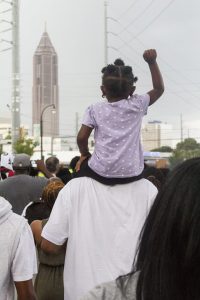 Lynnee Denise Bonner
Lynnee Denise Bonner
(Issue area: Intersection Between Music, Culture and Social Justice)
My first reaction was shocking disbelief and immediately following that I felt an overwhelming sense of numbness, almost like my system attempted to shut down in order to protect itself from the systematic dehumanization of Black people. I made a conscious decision to turn away from social media. I didn’t feel capable of participating in the Facebook collective grief ritual where we post stories, images, and videos of state sanctioned violence against people of color that come from poor, or more accurately, under-resourced communities. In the days following the declined indictment of Darren Wilson I found myself growing tired of discussions that centered the killing of Black boys and men. I understand the importance of identifying gender specific forms of violence, but the patriarchal world that we live in makes it impossible to remain trusting and open in conversations that exclude the experiences of black women and girls who are also targets of police brutality and racialized violence. As I sit in Los Angeles, California today I’m thinking about Latasha Harlins, the 15-year old girl who was shot to death in 1991 over an allegedly stolen orange juice by Korean storeowner Soon Ja Du. Ja Du received probation for Latasha’s murder. The verdict for this case preceded and exacerbated the Rodney King/LAPD not guilty verdict, leaving LA communities of color with feeling like the only option left was to riot/resist. Latasha’s name is removed from the public record when we recount this part of L.A. history. The majority of us site Rodney King as the sole cause for the rebellion and this erasure of the stories of Black girls function like an extension of the very violence we are working against. I am looking forward to having more nuanced conversations about the aggressive policing and the mass incarceration policies that impact all and not half of us. All Black Lives Matter.Dion Bullock
(Issue area: Racial Injustice in the Education System)
Thoughts on Ferguson
What can I say? There are so few yet so many words to describe my feelings around the tragic murder of Michael Brown:
– I am angered by the ease in which black men are literally demonized and exorcised by the American criminal justice system.
– I am overwhelmed by the sheer malice and intrusion of others during a time of mourning and uplifting in the black community.
– I am energized by the amazing conversations and content distributed through social media to counteract that same malice and intrusion
– I am humbled to know that no matter how many degrees, titles, and salaries that I receive, I can never escape the fear of becoming another black soul discarded by society.
Regardless of the refusal to bring an indictment against Officer Wilson, this is not a time for judgment. This is a time to listen; this is a time for education; this is a time for empathy.
Take the time to challenge yourself and others on long-held beliefs. Learn about the historical balance and use of violent and non-violent methods for change. Take as much time as needed to heal, but understand that we need to keep pushing, scratching, and lifting in the journey to reach a place of equity for all lives.
Activist Attorney Mawuli Davis Provides Tips and Strategies for Protestors
(Issue Area: Anti-Racism)
Paula Dressel
(Issue Area: Anti-Racism)
Hands up. Call the question. Ferguson, New York City, across the country. Racism kills. It kills people, kills spirits, kills dreams. Those of us who work in organizations, public and private, must put our hands up and call the question: Does my organization work in ways that advance racial equity, or does our failure to understand and address the ways that racism operates actually contribute to its perpetuation? The Race Matters
Institute offers a quick online Organizational Assessment to help answer this question: http://www.
Anthony Flaccavento
(Issue Area: Environmental and Food Justice)
A farmer’s take on Ferguson
My wife and I grow produce on our small organic farm, nestled among the mountains of Southwest Virginia. We sell the majority of what we grow in a “direct-to-consumer” fashion, though for most of the past 15 years we’ve also sold through a growers network to supermarkets, some as much as 350 miles away in places like Richmond, Virginia and Washington, DC. Tens of thousands of pounds of produce that started out on our farm has undoubtedly ended up in the kitchens of hundreds of folks whom we’ll never meet, never know. Some of the people buying our produce probably felt like they “knew their farmer”. I certainly hope so. But the fact is, we don’t know them, not in the least. We’re not connected.
Which brings me to Ferguson, or more accurately, to my country and its profound and widespread problem with race, still, in 2014.
For rural people like myself, especially white rural people, few things could seem more distant, more foreign than the criminal justice system. By now many Americans know that Black people and folks of color are in prison in great numbers. But far too many of us don’t know exactly why and assume, in some way, that it must be because they commit far more crimes, especially more violent crimes. Never mind the studies that show that Black youth and men are more than twice as likely to go to jail than their White counterparts for the same crime; or be arrested and charged before that; or to be stopped by police in the first place. The belief, however cloudy and unarticulated, persists among many Whites, perhaps more so in rural places: Black men are dangerous. Not all of them mind you, because we all know some who are quite nice. But for the most part… To read the entire piece which appeared in the Huffington Post, please click on this link: http://www.huffingtonpost.com/anthony-flaccavento/a-farmers-take-on-ferguso_b_6235150.html
Jaime Grant
(Issue Areas: Social Justice Leadership Development, LGBT Justice)
White Solidarity Diary, post the Ferguson decision
Dec 1
I am sick of journalists writing ‘a long history of racial tension’ when they mean ‘decades of white people in power engaging in illegal racist practices in housing, health care and employment.’
This is giving me life today:
Chris Rock:
“Here’s the thing. When we talk about race relations in America or racial progress, it’s all nonsense. There are no race relations. White people were crazy. Now they’re not as crazy. To say that black people have made progress would be to say they deserve what happened to them before.
So, to say Obama is progress is saying that he’s the first black person that is qualified to be president. That’s not black progress. That’s white progress. There’s been black people qualified to be president for hundreds of years…
You know, my kids are smart, educated, beautiful, polite children. There have been smart, educated, beautiful, polite black children for hundreds of years. The advantage that my children have is that my children are encountering the nicest white people that America has ever produced. Let’s hope America keeps producing nicer white people.”
Dec 2
I think one of the most powerful anti-racist actions white folks can take right now is to interrupt and counter the daily racist frameworks and ‘analyses’ of what’s happening. We need to stop talking about ‘healing’ and ‘reconciliation’ and ‘re-building’ and commit to the work of tearing down a white supremacist state. We need to stop talk about ‘looting’ in the streets and redirect to ‘looting’ of Black life. We need to stop saying riots and start saying uprising. We need to confront our white peers everywhere we go, in every venue.
Dec 3
All of these articles talking about “After Ferguson.” People: Ferguson isn’t over. Ferguson is happening. And what’s happening there is reshaping our nation and laying a path for ours and our children’s survival. To all those white queers who drew on MLK ad nauseam while ‘fighting for marriage’ and lamented the ‘lack’ of Black ‘allies’ — Where are you? To all of my beloveds in ACT-UP who screamed that ‘PEOPLE ARE DYING’ and threw blood on the stairs — where are you? We live in a nation that is slaughtering its children on the streets and blaming them for their deaths. We live in a police state that can be entirely ignored if you live a white, monied life. People are dying. Get in here.
Dec 4
As a young person, I drove drunk countless times, was pulled over at least twice. Never asked to step out of a vehicle and once escorted home by helpful police who flirted with me the whole way.
As a young addict, numerous people and institutions reached out to help me and I got three weeks of top-flight inpatient treatment, much of it ‘comped’ when insurance wouldn’t pay. Nearly all of my Black peers in recovery faced jail and/or humiliating mandated treatment designed to ‘break their will.’ #CrimingWhileWhite
Dec 5
When my white son was in his third week of the third grade at a DC public school, a boy teased him about keeping a journal and grabbed it off his desk. Reilly took a sharpened pencil and held it to the boy’s throat and said: Mohammed, I’m going to kill you! Instead of being suspended or expelled for violent behavior – as Mohammed certainly would have been if the tables had been turned – Reilly got lots of support and I was called into a meeting to help brainstorm how to address the “bullying” against my son. #schoolingwhilewhite
Cornelius Lloyd
(Issue Areas: Youth Leadership Development, Intergenerational Advocacy)
Ferguson, MO & No Indictment for Michael Brown
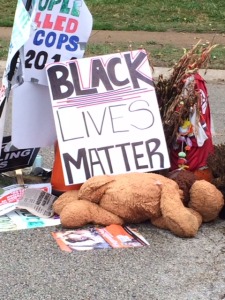 As I watched the St. Louis County Prosecutor, Robert McCulloch, read through the decision of the grand jury, I was listening so intently that I completely grew deaf to the words that came out of his mouth. The decision to not indict the officer (Darren Wilson) responsible for the death of Michael Brown, Jr., was saddening. We are taught that we should allow the judicial system to work. America is taught that rulings are made with fairness and equality. However, as I continued to watch this news special report, none of this felt fair nor did it feel like equality was taking place. It appeared that a grand jury was presented with information that would lead to a desired result of a non-indictment.
As I watched the St. Louis County Prosecutor, Robert McCulloch, read through the decision of the grand jury, I was listening so intently that I completely grew deaf to the words that came out of his mouth. The decision to not indict the officer (Darren Wilson) responsible for the death of Michael Brown, Jr., was saddening. We are taught that we should allow the judicial system to work. America is taught that rulings are made with fairness and equality. However, as I continued to watch this news special report, none of this felt fair nor did it feel like equality was taking place. It appeared that a grand jury was presented with information that would lead to a desired result of a non-indictment.
For 14 years I have advocated for the success and fair treatment of young people. My passion to see children, teenagers, and young adults is my life’s call and purpose. The state of our country causes me to be sad and at times discouraged. There are many reports circulating about the events that transpired on the day that Michael Brown, Jr. was killed. It is apparent to me that the issue of racism is one that has yet to be resolved in this country and abroad. An unarmed black male teenager was shot multiple times by a police officer and there is no trial. The fact that the judicial system stops here is alarming and is unfair. This incident has caused outrage in communities all over the country. The outrage is not only with this incident, the outrage is due to the historical negative race narrative that continues to bring up feelings of being treated unequally in America.
As we continue to try to digest the murders of Trayvon Martin, Jordan Davis, and now Michael Brown, Jr. We must remember that the parents of these teenagers are not only grieving the loss of their sons, but they are also dealing with how to model peace for all of us that empathize with them and feel sympathy for them. I commend these parents for having to speak on behalf of their children and the ways in which they help us through this season of despair.
Prayerfully, communities will unite to promote self-control, love, education, and faith in the hope of a better society.
My response to all of this will be to continue to advocate for the success and safety of our young people during their life transitions through mentorship, discipleship, love, and training. It is my prayer that each social justice activist leads with a similar heart to be servant leaders for our communities around the world.
Nathaniel Smith
(Issue Areas: Shared Prosperity, Inclusion and Equity)
Injustice Begins At Home:
Recently I was asked by an emerging leader in Atlanta about supporting her in traveling to Ferguson to engage in movement growing efforts there. The death of Michael Brown reminded us how the instruments of racial oppression not individuals are the key driver for inequity in our nation. These tools cross boundaries and jurisdictions and can be found in places beyond Ferguson. It is because of this fact and others that I encouraged this emerging leader to channel her anger, talents and passion towards fighting the war against injustice at home.
Our criminal justice, economic, housing and educational systems are undergirded by the most illogical and inefficient system known to humanity – structural racism. Structural racism has no regard for the interdependent nature of our society and economy or who is required to engage in making our communities more prosperous and sustainable. Structural racism is perpetuated and sometimes promoted by individuals that represent diverse races and class distinctions. Structural racism disregards the facts or logic. It is a fatal human glitch that hurts everyone’s ability to realize their full potential, not just communities of color. Michael Brown’s death and the subsequent legal process that eventually acquitted Darren Wilson allowed us to get a rare glimpse of the allusive face of structural racism. What we must understand is that the face we saw from Ferguson was a mere representation of a multi-headed monster that refuses to expose itself everyday in our communities. However, we know by the actions of its prophets it is present.
When Metro Atlanta’ rail system was not approved to expand throughout the region because of the fear some “suburban” populations had about “urban” communities traveling to their areas everyone suffered. Many experience the byproduct of this political decision everyday while sitting in gridlocked Atlanta traffic. Our water supply and air quality suffers because of the sprawling nature of Atlanta’s development patterns due to the mass exodus of whites from our urban core in the 20th Century. While many point to the Federal Highway Act as a cause for this move an equally important factor was the desegregation of Atlanta’s public schools. Our poor children of color live in “food deserts” because the “market” does not see these communities as a profitable location for grocery stores. We all suffer when these children grow up to become adults with a myriad of food related diseases and we have to pay for their utilizing emergency rooms as their primary form of healthcare.
If we are to fight the illogical and efficient system of structural racism we must be courageous enough to begin our fight at home. We must seek it out in common and uncommon places utilizing the transformational power of love as our weapon. We must be willing to “call out” people of color who utilize the politics of race as a barrier to honest critique and community accountability. We must work to undo public policies that benefit the few at the expense of current and future generations. We must be willing to create safe spaces and opportunities for our current and potential white allies to see themselves in the struggle for racial equity.
As a person of faith, I will continue to pray for Michael Brown’s family and the people of Ferguson. I will also recommit the Partnership for Southern Equity and myself to honoring Michael Brown by fighting the unjust system that ended his life and continues to oppress other people around the world at home. I invite you to do the same.
Shameka Poetry Thomas
(Issue Areas: Black Women’s Health, Birth/Mothering Culture, and Medical Sociology)
#DON’T SHOOT….because….We shed hot tears with deep pain. For the streets are in rage. And this time, we do not have words, so we shout #don’tshoot. So, if there is a way I can make a poem cry. I would write a remix from Sam Cooke’s hook: “I was born by the river, in a little tent, and just like a river, I been running ever since—it’s been a long time coming, but I know a change gone come, oh yes it will…”. (Excerpt of a poem by, Shameka Poetry Thomas)
I will discuss TWO points on the recent shootings & grand jury decisions in America: 1) Institutional Racism and 2) Black Emotions.
Institutional racism is when an ENTIRE structure, system, building, department, group CREATES whole policies, rules, redlines, red tape, procedures, and laws to PLACE white-ness in power and “minorities” in the margins. Institutional racism is what killed this unarmed black male teen in St. Louis. Institutional racism is what killed Eric Garner in NYC. Institutional racism is what killed Trayvon Martin. Institutional racism is what killed countless Black boys/men and Black girls/women whether physically or psychologically in this cobweb of systems. Whole systems block, deny, band, prohibit, and red tape Blacks and “minority” groups in the United States through institutional racism. Institutional racism occurs in legal institutions, medical institutions, educational institutions, and financial intuitions that privilege white people at the expense of Black/”minority” exploitation.
Black Emotions. When we say ‘Black on Black Violence’ it dismisses the emotional pain and suffering that black people feel when ‘White on Black Violence’ happens. This controls our emotions. Preventing Black rage, Black anger, Black tears, Black hurt from being viewed as a natural reaction to the issue at hand. It allows Whites to say things to a Black person like “well how could you get mad when black people kill each other every day?” PLEASE STOP! No, Black people do not KILL each other every day! There are tons of Black people trying to UPLIFT each other every day but that’s not highlighted in media. In fact, much of the within-group violence that tends to occur in Black communities around the world stems from White privilege, colonization, and system-injustice. So for example, LiL Ray-Ray killing LiL Pookie is not the reason why the police should get away with killing Eric Garner in NYC. These two occurrences are NOT the same type of violence! Nor should I be punished for crying in public or being the angry Black parent on the block. Nor should we be punished for feeling pissed! Being pissed and feeling rage is a natural emotional reaction to this violent attack on our Black children. My point is our reactions and emotions to this genocide on Black teens and Black children are valid!!!!!!!!!!!! I have a Black child and I am a Black mom—and I mourn when another Black mom or Black dad has lost their Black child due to institutional racism just the same!
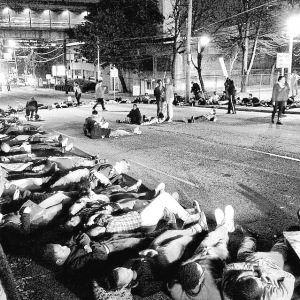 Beth Wettlin
Beth Wettlin
(Issue Areas: Children of Incarcerated Parents, Family Strengthening)
I think what the cases of Michael Brown, Travyon Martin and Eric Garner demonstrate is that the law does not, and arguably cannot, account for race. Even if it could, it would not bring these three men back.
The flaws in our justice system reflect deep rooted issues throughout American society. To me, justice will be served when black boys and black men are not perceived as a greater threat, more dangerous, or more quickly labeled “bad” than any other person. National data supports this reality showing disproportional: suspension of black boys, arrest and incarceration of black men, and violence against black boys and men.
It is my hope that Americans will acknowledge that we see the world through a colored lens. Based on our experiences (viewed, heard, and lived) we have biases that affect our interpretations of situations and influence our behavior. We must create a safe space for people of all races to realize that while these biases do not make us bad people, refusing to examine the presence and validity of bias and understand how it translates into our behavior is immoral as the potential consequence are dangerous and even deadly, as in the case of these three men.
Akinyele Umoja
(Issue areas: Political Prisoner Advocacy, Educational Justice)
The killing of unarmed Michael Brown is certainly a tragedy. It is also a reminder of the reality of the value of Black life in the U.S. The Malcolm X Grassroots Movement released a study documenting that in 2012 there were 313 extrajudicial killings of Black men, women, and children in the United States by police, security guards, and vigilantes. That was one life for every 28 hours of that year. Only 20% of those killed were armed. In 47% of the cases the shootings were “justified” by the claim that the perpetrators “felt threatened.” Any reasonable person should consider this situation genocide. The failure to get indictments against Darren Wilson or the officers who killed another unarmed Black man, Eric Garner, in New York reminds us that the system does not work for the oppressed Black nation.
On the other hand, the sustained resistance and protests of Black people and activists in Ferguson months after the death of Michael Brown may signal a new stage of the Black Liberation Struggle and the development of a new movement. The emergence of a new generation of freedom fighters lets us know that the struggle continues. It signals hope that We are not defeated as a people. Our Ancestors are pleased. Ase’!!!

